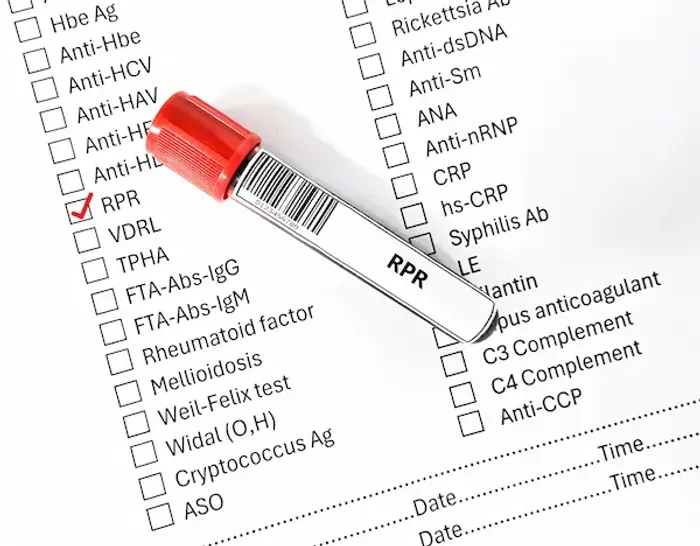RPR Test Overview and Procedures
Know about the rpr test, what it is, why it is done, symptoms of syphilis, how the test is done, interpretation of the result and how to manage syphilis.

Written by Dr. M L Ezhilarasan
Reviewed by Dr. Rohinipriyanka Pondugula MBBS
Last updated on 29th Aug, 2025

Introduction
If you’ve been advised to take an RPR (Rapid Plasma Reagin) test, you might have questions about what it is, why it’s needed, and what to expect. This simple guide will help you understand the test, its purpose, and how it can impact your health.
What is an RPR Test?
The RPR test is a blood test used to screen for syphilis, a sexually transmitted infection (STI) caused by the bacterium Treponema pallidum. The test checks for antibodies (proteins your body produces in response to infection) that indicate a possible syphilis infection.
Consult a Haematologist for Personalised Advice
Why is the RPR Test Done?
- Screening for Syphilis – The test helps detect syphilis early, especially in people with symptoms or those at higher risk (e.g., sexually active individuals, pregnant women).
- Prenatal Care – Pregnant women are often tested to prevent transmission to the baby (congenital syphilis).
- Monitoring Treatment – If you’ve been treated for syphilis, the RPR test helps track how well the treatment is
working.
Symptoms of Syphilis
Syphilis progresses in stages, with varying symptoms:
- Primary Stage: A painless sore (chancre) at the infection site (genitals, mouth, or rectum).
- Secondary Stage: Rash (often on palms and soles), fever, swollen lymph nodes, and fatigue.
- Latent Stage: No symptoms, but the infection remains in the body.
- Tertiary Stage (Rare): Severe complications affecting the heart, brain, and nerves.
If untreated, syphilis can cause long-term health problems, so early detection is crucial.
Get Your Health Assessed
How is the RPR Test Done?
The procedure is quick and simple:
- Blood Sample Collection – A healthcare professional will draw a small amount of blood from your arm.
- Lab Analysis – The sample is tested for antibodies related to syphilis.
- Results – Usually available within a few days.
What Do the Results Mean?
- Non-Reactive (Negative): No syphilis antibodies detected.
- Reactive (Positive): Possible syphilis infection, but further testing (like an FTA-ABS test) is needed to confirm.
A false-positive can sometimes occur due to other infections (like HIV or lupus), so additional tests may be required.
What Happens if the Test is Positive?
If confirmed, syphilis is treatable with antibiotics (usually penicillin). Early treatment prevents complications. Your
doctor will guide you on:
- Completing the full course of medication.
- Avoiding sexual contact until treatment is complete.
- Testing and treating sexual partners if needed.
Tips for Managing and Preventing Syphilis
The tips for managing and preventing syphillis:
- Practice Safe Sex – Use condoms to reduce the risk of STIs.
- Regular Testing – If sexually active, get tested periodically, especially with multiple partners.
- Prenatal Screening – Pregnant women should get tested to protect their baby.
- Follow-Up Testing – If treated, repeat tests ensure the infection is fully cleared.
When to See a Doctor?
Consult a healthcare provider if you:
- Have symptoms of syphilis.
- Had unprotected sex with a partner who has syphilis.
- Are pregnant and haven’t been tested.
Final Thoughts
The RPR test is a simple, important tool for detecting syphilis early. Whether you’re getting screened as a precaution or due to symptoms, knowing your status helps protect your health and others. Stay informed, practice safe habits, and seek medical advice when needed.
Consult a Haematologist for Personalised Advice
Consult a Haematologist for Personalised Advice

Dr.sanchayan Mandal
Medical Oncologist
17 Years • MBBS, DrNB( MEDICAL ONCOLOGY), DNB (RADIOTHERAPY),ECMO. PDCR. ASCO
Kolkata
Dr. Sanchayan Mandal Oncology Clinic, Kolkata

Dr. Sonal Paul
Haematologist
9 Years • MBBS, MD Pathology, DM Clinical Haematology
Kolkata
SATKRIT HEALTHCARE - A MULTISPECIALITY CLINIC, Kolkata

Dr Ankit Kumar
Haematologist
8 Years • MBBS, MD(Pathology), DM (Clinical Haematology)
Gurugram
The DermHaem Clinic, Gurugram

Dr. Thorana Prakash M
General Physician
2 Years • MBBS
Bengaluru
PRESTIGE SHANTHINIKETAN - SOCIETY CLINIC, Bengaluru
Dr Sumanth R
General Physician
2 Years • MBBS
Bengaluru
PRESTIGE SHANTHINIKETAN - SOCIETY CLINIC, Bengaluru
Consult a Haematologist for Personalised Advice

Dr.sanchayan Mandal
Medical Oncologist
17 Years • MBBS, DrNB( MEDICAL ONCOLOGY), DNB (RADIOTHERAPY),ECMO. PDCR. ASCO
Kolkata
Dr. Sanchayan Mandal Oncology Clinic, Kolkata

Dr. Sonal Paul
Haematologist
9 Years • MBBS, MD Pathology, DM Clinical Haematology
Kolkata
SATKRIT HEALTHCARE - A MULTISPECIALITY CLINIC, Kolkata

Dr Ankit Kumar
Haematologist
8 Years • MBBS, MD(Pathology), DM (Clinical Haematology)
Gurugram
The DermHaem Clinic, Gurugram

Dr. Thorana Prakash M
General Physician
2 Years • MBBS
Bengaluru
PRESTIGE SHANTHINIKETAN - SOCIETY CLINIC, Bengaluru
Dr Sumanth R
General Physician
2 Years • MBBS
Bengaluru
PRESTIGE SHANTHINIKETAN - SOCIETY CLINIC, Bengaluru